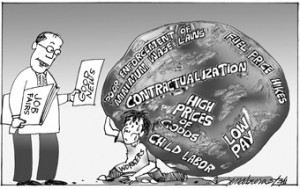BY RESIGNING, Ombudsman Merceditas Gutierrez has spared the nation the agony of a protracted, consuming and expensive impeachment trial that threatened to further divide the nation and rake up old wounds that might be past healing, a canker that could explode. But as a member of the bar, she should understand that her act does not fully satisfy the requirements of justice. She might have saved herself from conviction in an impeachment trial, but she should realize that it does not spare her from prosecution. The demands for accountability should be satisfied even after she has resigned.
Gutierrez herself has reaffirmed her allegiance to “the Constitution and the Filipino people.” The same Charter requires accountability from all public officials. To be sure, considering the nature of the work of the ombudsman, the requirements may be tougher. The ombudsman is the principal anti-graft prosecutor; she’s the anti-corruption champion and chief good-government warrior. It’s a commission that’s constitutionally ordained.
But it’s also in the nature of the commission that Gutierrez as ombudsman suffered so much criticism. Because she was appointed by Gloria Macapagal-Arroyo, Gutierrez has been perceived as protective of the former president and her key officials. Several charges of corruption and malfeasance have been filed against the former administration and its officials, but they seemed to have suffered stasis in the ombudsman’s desk. The straw that broke the camel’s back appears to be the plea bargain that Gutierrez apparently struck with former military comptroller Carlos Garcia. Now that plea bargain may be rejected by whoever is appointed as ombudsman.
The nature of the commission is such that the ombudsman would have to contend with changes in the administration. Although Gutierrez was supposed to be ombudsman till next year, the election of a new administration meant that she had to deal with a new set of political factors that might complement or cripple her work. Considering that the new administration rode on the crest of a popular outpouring against the depredations of the past, a clash between the ombudsman and the new regime was unavoidable.
Gutierrez had to confront the reality of politics. Although independent, the ombudsman is not shielded from politics. Gutierrez knew that. She had sought to protect the prerogatives and independence of her office legally and constitutionally. But when the Supreme Court gave the go-signal for the House of Representatives to start the impeachment process, she realized it would be a lost cause to continue with her defense and resistance since, although impeachment is also a constitutional process, it is chief and foremost, a political process.
There have been speculations on the real reasons for her resignation. Most revolved around politics. But of course, there are political reasons in her decision to quit. Suffice it to say that Gutierrez knew that she was playing a game of “brinkmanship” as Manila Auxiliary Bishop Broderick Pabillo put it, one where she had “to dance according to the music.” Brinkmanship also means that she must confront the reality that she may still be prosecuted and has to face her accusers even after her resignation.
Gutierrez also knows that all suits pertaining to her acts of commission or omission as ombudsman will have to be filed with the Department of Justice. She will have her day in court.
Her spokesman, lawyer Tomas Syquia, said that if suits would be filed, she would face these as a “private citizen.” In fact, when she announced her resignation, Gutierrez said she would not like to be perceived to be using the influence of her office to protect herself. She said she would like to spare the nation the agony and expense of a protracted fight. “I wanted to face my accusers whatever the personal agony it would have involved,” she said. “But the interests of my family, my office, and more importantly, the nation, must always come before any personal considerations.”
In the final analysis, the constitutional process acquitted itself well in this episode. All the protagonists played their parts well, and it has been instructive for the public to witness the give-and-take of the actors in the wider drama of pressing for good government. But theater should give way to trenchant reality and the pressing need for public accountability.


